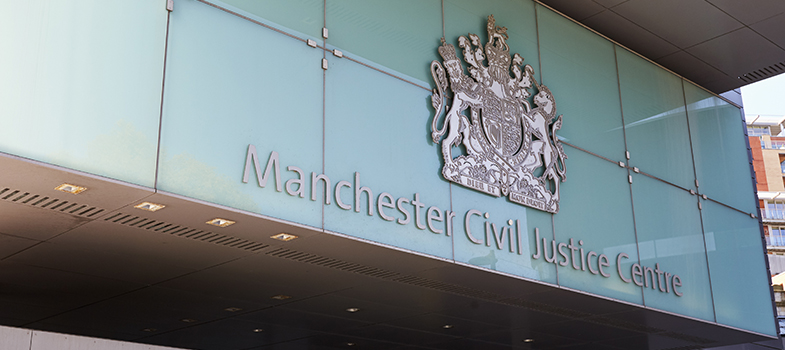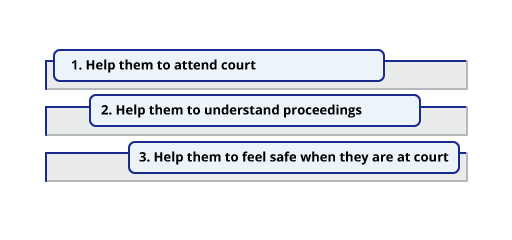9.4 Court Support for Vulnerable Individuals
The Court has a duty to consider whether a person’s participation in the proceedings is likely to be diminished by reason of vulnerability and, if so, whether it is necessary to make one or more reasonable adjustments.
Specifically, the court should consider the ability of the party or witness to understand the proceedings, and their role in the court proceedings. This includes being able to put their views to the court, instruct their representative/s before, during and after the hearing and attend the hearing without significant distress.
There are typically three things a court can do to support a vulnerable person.
We will now look at each of these in turn.
Activity 5
The Court can put measures in place to help a vulnerable person feel safe when they are in court. These are sometimes called participation measures or special measures. They may include separate waiting areas, screens in court, using a separate entrance and exit, and even giving evidence remotely. It is always worth checking with the court usher on the day to see what, if any, adjustments have been made. Remember that these reasonable adjustments are at the discretion of the judge. You can find out more by studying our Special measures [Tip: hold Ctrl and click a link to open it in a new tab. (Hide tip)] module.
Activity 6
It is really important that the court is informed about someone’s vulnerability as early as possible in the process. How would you do this?
Comment
Particular vulnerabilities can be identified on the appropriate court application form. Ask your Service Manager about any specific local arrangements that may be in place.
Did you know?
It is important to be thoughtful when dealing with vulnerabilities. It might be that what makes someone vulnerable is extremely personal and they may find it hard to talk about it and to disclose it to the court. These matters will need handling with great sensitivity. You can always ask a fellow volunteer, or your Service Manager, for guidance.
Activity 7
Please complete the following questions. There is one correct answer to each question.
a.
People with a disability are more likely to be vulnerable.
b.
Only women can be vulnerable
c.
Many litigants in person are vulnerable
The correct answer is b.
Answer
The correct answer is only women can be vulnerable. Anyone can be vulnerable for different reasons.
a.
To consider the ability of someone to understand the court proceedings
b.
To consider a person’s occupation
c.
To consider whether the person is the applicant or respondent in the court proceedings
The correct answer is a.
Answer
The correct answer is to consider the ability of someone to understand the court proceedings.
a.
Language barrier
b.
Mental health issues
c.
Being middle aged
d.
Sight/hearing loss
The correct answer is c.
Answer
The correct answer is being middle aged.
a.
A free qualified lawyer
b.
An intermediary
c.
A voluntary support worker
d.
A social worker
The correct answer is b.
Answer
The correct answer is an intermediary.
a.
Tell the court usher
b.
Verbally to the judge
c.
Filling out a relevant court form
d.
By letter to the judge
The correct answer is d.
Answer
The correct answer is by letter to the judge. Letters and emails to judges often fail to reach the judge hearing the case.
9.3 Vulnerability and Unconscious Bias

